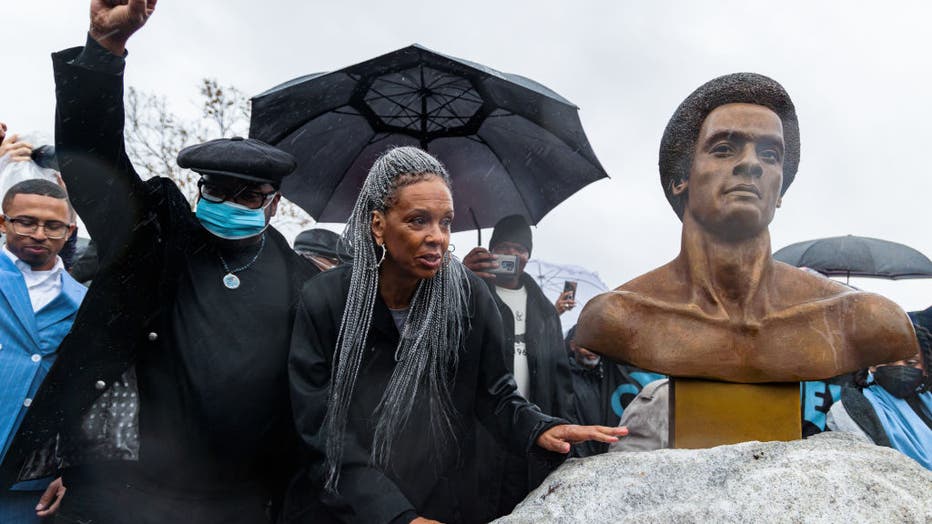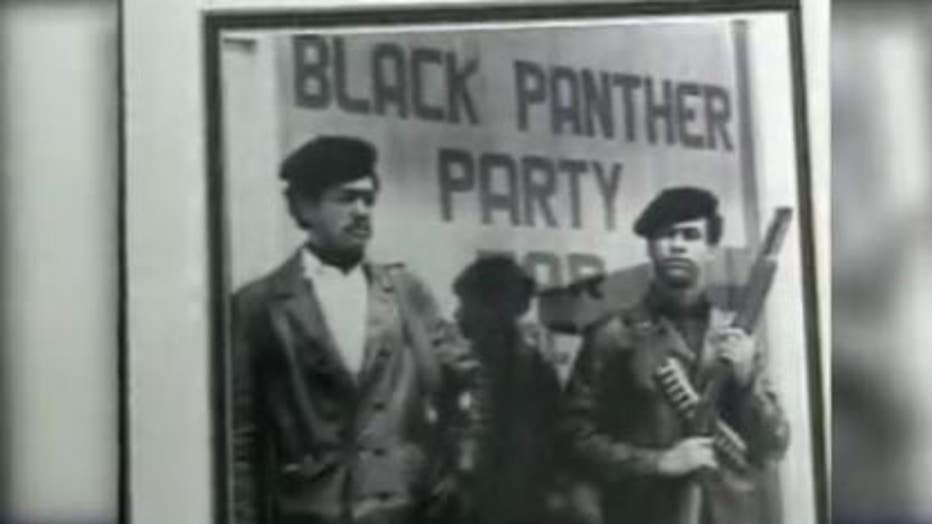Huey Newton bronze bust installed in Oakland, the first permanent statue honoring the Black Panther co-founder
OAKLAND, Calif. - More than 30 years after his death, the city of Oakland has its first permanent public art piece honoring Huey Percy Newton, the co-founder of the Black Panther Party.

OAKLAND, CALIFORNIA, USA - OCTOBER 24: Fredrika Newton (2nd L), the widow of Black Panther Party's co-founder Huey Percy Newton unveils the bust of Huey Percy Newton, what is to become the first permanent public art piece honoring the party in the ci (Getty Images)
On Sunday, a bronze bust was unveiled at Mandela Parkway and Huey P. Newton Way in West Oakland, not far from where the icon and activist was killed at the age of 47.
Newton’s widow, Fredrika Newton, was among community leaders, Panther alumni, friends and family who gathered for the unveiling of the sculpture, which also celebrated the 55th anniversary of the revolutionary political group widely considered the country’s most influential militant Black power organization.

Archive image of Black Panther co-founder Huey Percy Newton with Fredrika Newton.
The Oakland-based Dr. Huey P. Newton Foundation, co-founded by Newton's widow, said on its website that the memorial marked "the first time in our nation's history that a Black Panther has ever been commemorated by a permanent statue."
Former Bay Area journalist and celebrated sculptor Dana King was commissioned to create the piece.
SEE ALSO: Part of Ninth Street in West Oakland named for Huey P. Newton
Newton attended Merritt College in Oakland where he met Panther co-founder Bobby Seale. The two went on to establish what they initially called the Black Panther Party for Self Defense in October 1966, as Newton took the role of the minister for defense and Seale, the party’s chairman.
The Panthers became deeply rooted in Black communities in the U.S. and abroad, implementing social welfare programs like free breakfast for schoolchildren, free medical clinics, and free sickle cell disease testing.
SEE ALSO: Oakland home converted to mini-museum about Black Panthers
The group also worked to combat police brutality which Newton and Seale both witnessed and experienced. Among the party's ideologies, was a belief in armed self-defense, particularly in the face of police brutality, as they took on a role of "policing the police."

Archive image of members of the Oakland-founded Black Panthers Party.
Many credit the legacy of the Black Panther Party for its heavy influence on today's Black Lives Matter movement.
SEE ALSO: From Black Panthers to Black Lives Matter: The fight for equality continues
Newton is still considered a divisive figure and the party he founded has been both celebrated, while its antagonistic relationship with law enforcement has long cast a shadow over its legacy.
In 1967, Newton was jailed for the shooting death of an Oakland police officer who had pulled him over. The Panther leader himself was shot during the encounter, and he denied being responsible for the officer’s death. He was tried and convicted of voluntary manslaughter in 1968.
His imprisonment sparked the "Free Huey" campaign, which helped make him a symbol of racial injustice in the American criminal legal system. In 1970, his conviction was ultimately overturned.
The Black Panther Party folded in 1982, following years of police surveillance, as well as dwindling national membership, infighting, allegations of embezzlement and scandals in which Newton was implicated and criminally charged.
SIGN UP FOR THE KTVU NEWSLETTER
Newton struggled with alcohol and drugs addictions. And on Aug. 22, 1989, he was fatally shot in West Oakland by a drug dealer.
In an interview with the Associated Press, Fredrika Newton said that the sculpture of her late husband was meant to celebrate his life and contributions to American history, without dismissing all that made him human.
"I would like for people to see him as a total human being," said Newton, "That he wasn’t just an iconic figure in a wicker chair. This was a man with vulnerabilities, with feelings, with insecurities, with frailties, just like anybody."
The Associated Press contributed to this story.

